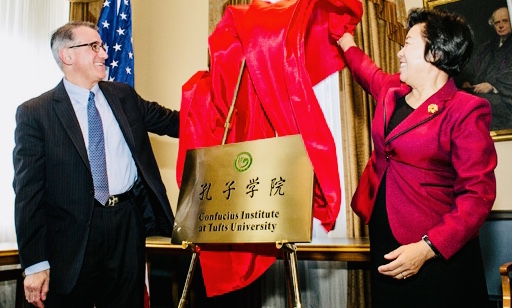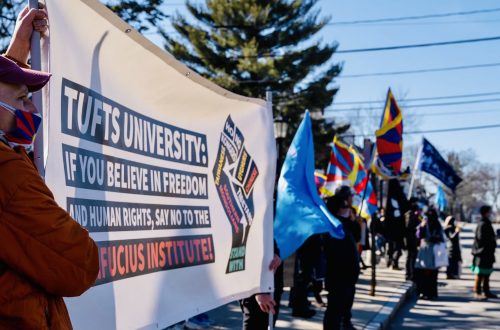
美大學關閉孔子學院,仍與中方繼續合作
US Schools Keep Ties with China after Closure of Confucius Institutes
美國「波特蘭州立大學」和「塔夫茨大學」先後宣布關閉孔子學院,但均表示將繼續保持並加強與中國大學的合作。孔院是否以某種非官方形式繼續對美國高校施加影響力?
Portland State University and Tufts University recently announced the closures of the Confucius Institutes, but both stated that they will strengthen their ties with the Chinese partners. Will the CIs remain influential in an unofficial form?

Tibetan, Uyghur, Taiwan, Hong Kong, and Chinese community in Boston area protest in front of the Confucius Institute at Tufts University on March 13, 2021.
| 週三上午,波士頓藏人協會政治倡導主席、台灣人公共事務會馬薩諸塞主席Howard Fass興奮地給我發來短信,說他們持續的抗議有了成果,「塔夫茨大學」今天終於宣布關閉孔子學院。
這是一個鼓舞人心的消息。要知道早在2019年,波士頓社區質疑塔夫茨孔子學院的聲音漸起,校方專門成了一個委員會,審核孔子學院合約,聽取各界意見,當地藏人團體把我的紀錄片《假孔子之名》寄給校方,我自己也寫信給委員會主席Diana Chigas女士,陳述孔院弊端,但塔夫茨最終仍決定續簽合約,繼續開辦孔子學院。 最近幾個月,藏人團體聯合台灣、維吾爾、香港、及華人社區,每個星期六在塔夫茨孔子學院外和平抗議,並在上週六3月13號舉行了大型集會,Howard在集會上念了我寫給活動的一封支持信。 幾天後就傳來這個好消息,的確讓我們都感覺振奮,特別是昨天在接受荷蘭記者採訪時,我聽到她對於抗擊中共顯得那麼沒有信心,我知道對很多才剛剛了解到中共政權之邪惡的人來說,今天這個消息是一個多麼積極的信號——堅持就是勝利! 然而,當你讀塔夫茨大學的聲明就會發現,他們雖然(迫於壓力)決定關閉孔子學院,但表示要繼續保持與中方夥伴「北京師範大學」的直接合作——不僅在美國的校內繼續合作中文項目,更將美國學生送到北師大的「塔夫茨在北京」項目。 俄勒冈州的「波特蘭州立大學」情形與此類似。他們的孔子學院從2019年起也經歷了內部質疑、審查、討論,我的紀錄片也曾於2019年3月在校內放映討論。今年1月底,波特蘭州立大學终于宣布關閉孔子學院,但同時表示將繼續保持與中方夥伴「蘇州大學」的合作。 我從一位校內人士那獲取的一封內部電郵顯示,波特蘭州立大學做出这个決定的主要原因是怕損失聯邦政府撥款,而對於孔子學院箝制言論自由、输出中共宣传等的擔心只是次要的考量。「他們很捨不得這個孔子學院」,那位校內人士告訴我。 事實上,美國關閉孔子學院的近五十所大學在發表的聲明中,只有屈指可數的幾所大學提到了對孔子學院的擔心,其它的都清一色地讚揚孔子學院對本校的貢獻。這一方面可以理解為,大學關閉孔子學院在事實上已經冒犯中共,因此言詞上要給對方留些面子。另一方面,所有孔子學院合約中有一項固定條款——不得以任何形式損害孔子學院的名聲。這個條款在實際運作中成為西方大學不得批評孔子學院的緊箍咒。 反對孔子學院不是反對學習中文,也不是反對學術交流與合作,而是反對中共政府利用孔子學院影響和滲透西方學校。我很遺憾地看到,很多大學選擇短期利益,而忽視中共政權帶來的長期威脅和損害。 眾所周知,中國的每一所大學都由中共牢牢控制,尤其是名校。如果孔子學院只是名義上消失,中共對外國教育機構的影響仍藉由學術合作與交流在實際進行,那西方社會對這種合作仍然需要繼續保持警惕。 |
Late this morning, I got a message from Howard Fass, Political Advocacy Chair for The Tibetan Association of Boston, and President of FAPA, Massachusetts. It said that their effort was paid off —— Tufts University would close its Confucius Institute.
This is really encouraging! Back in early 2019, the Boston Tibetan community raised questions about the Tufts Confucius Institute (CI) and held a screening of my film on campus. The university formed a committee to review the CI partnership and held a public hearing. I also wrote a letter to the chair of the committee, sharing my research. However, Tufts decided to renew the CI contract. In recent months, the Tibetan groups have joined effort with local Taiwanese, Uighur, Hong Kong, and Chinese communities to launch a campaign where demonstrators had been protesting peacefully outside the Tufts CI every Saturday. On the past Saturday, March 13, they held a large rally, where Howard read my letter of support. I didn’t anticipate Tufts to respond to the pressure so quickly, yet the good news came just in time——I’ve realized from my conversation with a Dutch journalist yesterday that people like her who has just had some understanding of the evilness of the Chinese Communist Party (CCP) was easy to be pessimistic about countering the Party——The closure of the Tufts CI is an encouraging example of how persistence makes changes, even when your enemy is the CCP. However, Tufts’ statement says that they will strengthen their direct collaboration with Beijing Normal University (BNY), to continue their Chinese language program on campus, as well as the “Tufts in Beijing” program through which American students would study at BNU. Portland State University (PSU) in Oregon is in the similar situation. Their Confucius Institute had undergone internal questioning and debate since 2019. My documentary was screened and discussed on campus in March 2019. In January this year, PSU announced the closure of its CI. Yet, again, the university would continue to work with its Chinese partner, Soochow University. Before PSU’s announcement, I had obtained a copy of an internal email, which showed the calculation behind the closure. It was the fear of losing federal funding, rather than the worry about the compromise of academic freedom, that PSU eventually made the decided, “with much reluctance”, my source told me. In fact, among the nearly 50 American universities that closed the Confucius Institutes, only a handful schools expressed concerns about the CIs, and the rest unanimously praised the CIs. On the one hand, it’s logic to believe that the universities didn’t want to offend the Chinese government twice——the closure of the CIs was indeed offensive in the eyes of the CCP, the wording of the closure then need to be polite thus to save the CCP face. On the other hand, all Confucius Institute agreements have a clause which requires that the host institutions shall not in any way tarnish the reputation of the CIs. This clause has in fact become a straitjacket for Western universities not to say anything negative about the CIs. Opposition to the Confucius Institutes is not opposition to Chinese language education, nor to academic collaboration, but to the Communist Party’s use of CIs to influence and infiltrate into the Western schools. It is not a secret that all Chinese universities are controlled by the Chinese Communist Party, especially the prestigious ones. If the Confucius Institutes disappear in name only, and the CCP’s influence operation keeps going on foreign campus through academic cooperation and exchanges, then Western societies need to be vigilant to any partnership with China. |




